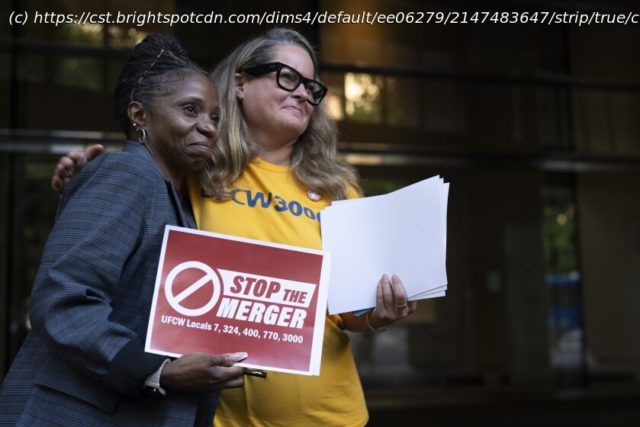The Federal Trade Commission sued to prevent the $24.6 billion deal, alleging it would eliminate competition and raise grocery prices. Albertsons, owner of Jewel-Osco, said nixing a merger could mean layoffs.
Supermarket chain Albertsons told a federal judge Monday that it might have to lay off workers, close stores and even exit some markets if its planned merger with Kroger isn’t allowed to proceed.
The two companies proposed what would be the largest supermarket merger in U.S. history in October 2022. But the Federal Trade Commission sued to prevent the $24.6 billion deal, alleging it would eliminate competition and raise grocery prices in a time of already high food price inflation.
In the three-week hearing that opened Monday, the FTC is seeking a preliminary injunction that would block the merger while its complaint goes before an in-house administrative law judge.
“This lawsuit is part of an effort aimed at helping Americans feed their families,” the FTC’s chief trial counsel, Susan Musser, said in her opening arguments Monday.
Musser said Kroger and Albertsons compete in 22 states, closely matching each other on price, quality, private label products and services like store pickup. Shoppers benefit from that competition, she said, and will lose those benefits if the merger is allowed to proceed.
Customers also are wary of the merger, the lawyer said. In Santa Fe, New Mexico, for example, 278 shoppers wrote to the FTC to express their concerns about a combined Kroger and Albertsons, which would own five of the city’s eight supermarkets.
But Kroger and Albertsons insist the FTC’s objections don’t take into account the rising competition in the grocery sector. Walmart’s grocery sales totaled $247 billion last year, compared to $63 billion in 2003, for example; Costco’s sales have grown more than 400% in the same period.
“Consumers are blurring the line of where they buy groceries,” Albertsons attorney Enu Mainigi said.
Home
United States
USA — Financial Kroger, Albertsons defend merger plan in federal court against U.S. regulator objections






